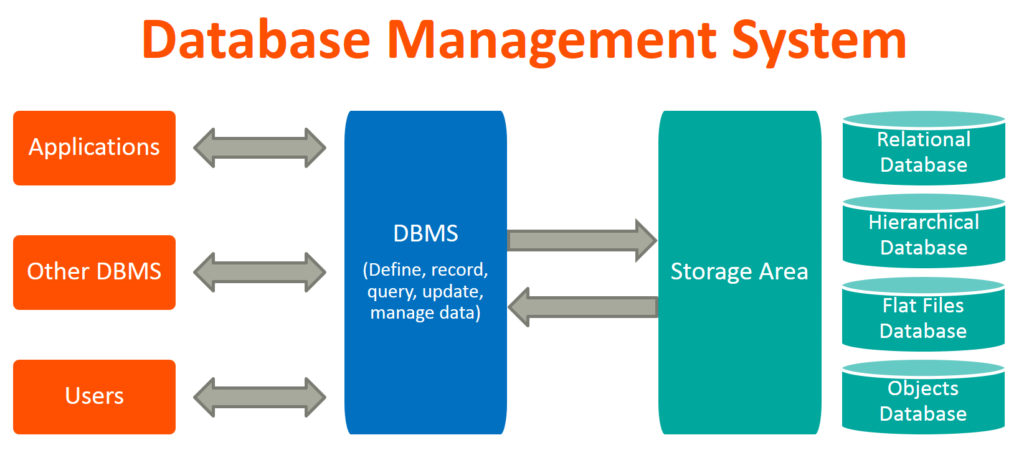Database management System is software which is used to store and retrieve the database. For example, Oracle, MySQL, etc.; these are some popular DBMS tools. DBMS provides the interface to perform the various operations like creation, deletion, modification, etc. Promo codes for jackpot party casino on facebook. A database is a collection of data or records. Database management systems are designed to manage databases. A database management system (DBMS) is a software system that uses a standard method to store and organize data.
There are several requirements you should consider before selecting a database management solution. As we've covered above, architecture is critical. Depending on what kind of data you have, a relational database may or may not be appropriate.
Your administration needs also play a major role. Do you, for instance, need change management capabilities? What about backup and recovery? Qr code generator wifi. Do you need these functions built-in, or can you add on products later?
Everyone agrees that data stores just keep getting larger, so scalability is also a factor that should affect your decision. When looking at database software, you should understand how growth can be managed and how the system can adapt to upgrades throughout your IT infrastructure.
Although deployment may seem light years away now, you'll be in trouble if you don't think through installation and the systems you need to have pre-implemented at the start of your purchase process. And speaking of deploying your new solution, will you have the essential IT skills on hand to do it successfully? Not all database administrators and app developers are created equal, and your solution might (or in the case of low-code solutions, might not) require a very specific set of technical competencies. For example, if you are implementing a non-relational database management system, a relational expert may not do.
Software undergoes constant innovation, and database software is no exception. There are a variety of types as well as degrees of intricacy, so it is important to pick the right one for your unique processes. Not sure what type of software you are looking for? Check out the Quick Base Platform to see if it is the right fit for you!
- Related Questions & Answers
- Selected Reading
A Database Management System (DBMS) is defined as the software system that allows users to define, create, maintain and control access to the database. DBMS makes it possible for end users to create, read, update and delete data in database. It is a layer between programs and data.
Compared to the File Based Data Management System, Database Management System has many advantages. Some of these advantages are given below −
Reducing Data Redundancy
The file based data management systems contained multiple files that were stored in many different locations in a system or even across multiple systems. Because of this, there were sometimes multiple copies of the same file which lead to data redundancy.
This is prevented in a database as there is a single database and any change in it is reflected immediately. https://hereifil230.weebly.com/blog/microsoft-office-for-mac-2016-v15-22-update-license-installer. Because of this, there is no chance of encountering duplicate data.
Sharing of Data
In a database, the users of the database can share the data among themselves. There are various levels of authorisation to access the data, and consequently the data can only be shared based on the correct authorisation protocols being followed.
Many remote users can also access the database simultaneously and share the data between themselves.
Data Integrity
Data integrity means that the data is accurate and consistent in the database. Data Integrity is very important as there are multiple databases in a DBMS. Emcee for itunes and spotify 2 0 2. All of these databases contain data that is visible to multiple users. So it is necessary to ensure that the data is correct and consistent in all the databases and for all the users.
Data Security
Data Security is vital concept in a database. Only authorised users should be allowed to access the database and their identity should be authenticated using a username and password. Unauthorised users should not be allowed to access the database under any circumstances as it violates the integrity constraints.
Privacy
The privacy rule in a database means only the authorized users can access a database according to its privacy constraints. There are levels of database access and a user can only view the data he is allowed to. For example - In social networking sites, access constraints are different for different accounts a user may want to access.
Backup and Recovery
Database Management System automatically takes care of backup and recovery. The users don't need to backup data periodically because this is taken care of by the DBMS. Moreover, it also restores the database after a crash or system failure to its previous condition.
Data Consistency
What Is Database System In Khmer

What Are Database
Data consistency is ensured in a database because there is no data redundancy. All data appears consistently across the database and the data is same for all the users viewing the database. Moreover, any changes made to the database are immediately reflected to all the users and there is no data inconsistency.
